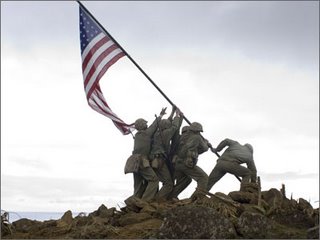Know Thy Enemy

Clint Eastwood is quietly preparing to release his latest film, "Flags of Our Fathers" onto movie screens on October 20th. The film tells the story of the brave men who fought the battle of Iwo Jima and went on create one of the most enduring images of the war. I say quietly because so far the media campaign surrounding this film has been rather quiet considering the fact that it is a Clint Eastwood movie and the fact that several of Clint Eastwood's last movies have gone on to win Oscars. The early buzz on this film is much the same, that there is definitely a chance for this film to do well at the Oscars again. Thus, it's rather surprising that the media campaign for this film is so... subdued. It's even more surprising that there is no mention of the fact that this film is only part of the story. Concurrently there is another film being made which will tell the story from the Japanese perspective.
Some may ask what is so unique about this? Many movies have filmed two parts concurrently in the past. The most recent, and probably most well known being the "Lord of the Rings" movies. What makes this film stand out for me is what Clint Eastwood and company are attempting to do. I have long been a World War II buff as are most males (or so it seems) and as such I have tried to absorb as much material as I can on the subject. I've read countless books, seen countless documentaries and seen a whole slew of movies in an effort to gain a better understanding of the conflict that helped shape the world for the remainder of the twentieth century and beyond.
Watch any of the movies from the 1950's onward on the subject and it classically portrayed the Allies in the most heroic light possible. And why shouldn't they? They were heroes, one and all and they served their cause bravely and valiantly. But what about the other side? Were they all totally evil? In a manner of speaking, they were. They were opposed to our point of view so they had to be evil right? But was this really the case? For years, there was never any attempt to show the perspective of the losing side with any degree of realism. Often times, the enemies in these and more modern conflicts were shown in the stereotypical light. It made it easier to hate them and root for the bad guys.
But the latest trend in movies appears to be softening that image. Eastwood's companion film to "Flags of Our Fathers" attempts to show the Japanese perspective on things. And from the sound of it, it is attempting to bring truth to the image of the Japanese in the war. Both sides had their fanatics to be sure. Neither side could claim to be completely right in their cause. Whatever it was they fought for, it was something they believed in. Does that make it evil? In the American Civil War, the south was always portrayed as being for slavery and oppression. While this is true, it wasn't the only motivation for the war and their eventual sessesion from the Union. The movie "Gods and Generals" attempted to show the perspective of the Confederate cause and it was met with a great deal of resistance. People complained that it portrayed the Southerners in a sympathetic light.
It stunned me to think that people, American people, did not want to see the perspective of those with a slightly opposing point of view. Did it mean that people would suddenly rise up in rebellion again at seeing the film? Perhaps or perhaps not, but why not show it? Similarly, the German film "Downfall" portrays Hitler's last days in his bunker. The film is brilliantly acted and attempts to show a purely German perspective on the end of the war. Again there was an outcry from those who felt this would bring increased sympathy to the Nazi cause.
These types of arguements leave me puzzled. I agree that what these sides did was not for the best and that it is good that these points of view were defeated. But I also think it's important to understand what motivated it. There's an old saying which says that, 'those who forget history are doomed to repeat it.' That is never more true than today. No matter what part of the world we are in conflict in, it is important to understand our enemy and understand what motivates them. By doing so, it may help us find a solution to the problem that will cost us less than the continued loss of our brave men and women in uniform. You may not agree with the point of view, but at least you will understand why it was there in the first place and you will solidify what it is you object to in the first place.
Labels: Movies

1 Comments:
Count me as extremely psyched for this one, even if I have doubts about some of the casting (Ryan Philippe!?!) ... As for the two versions, only a director with the pull of Eastwood would be able to get away with this, but I appreciate his desire to explore both perpspectives, and will definitely see both flicks
Post a Comment
<< Home